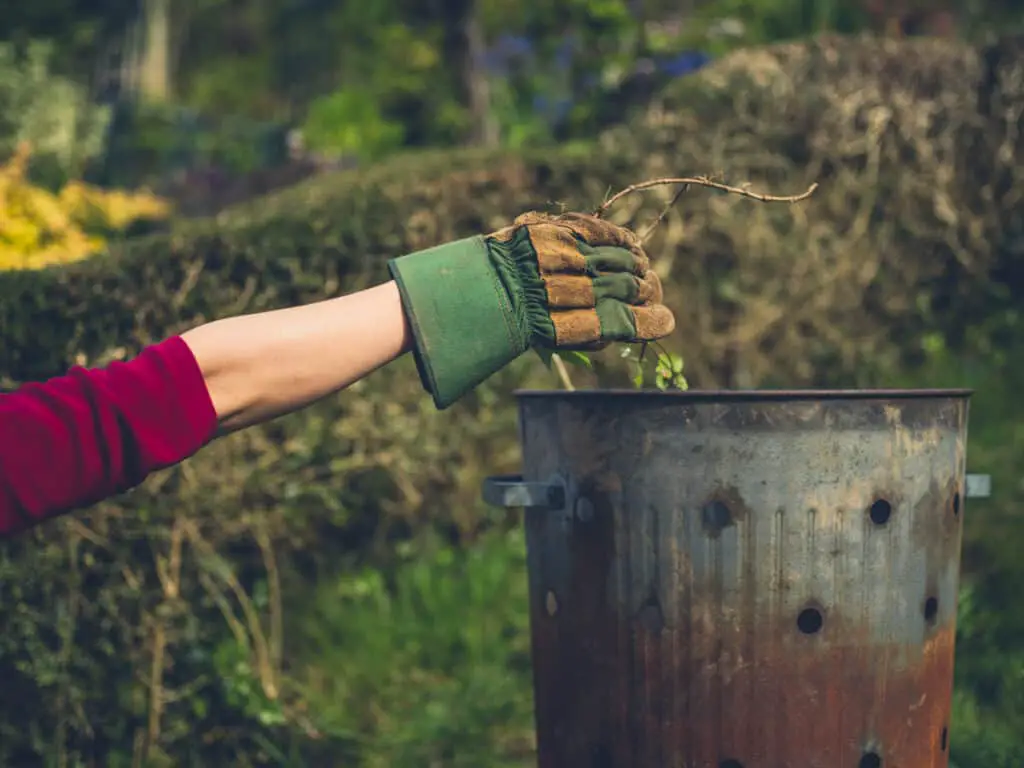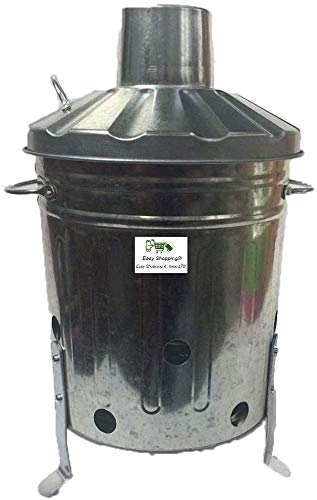We’ve discussed burning rubbish in your garden before on the site in terms of having a bonfire and what time you can burn rubbish in your garden. While it’s legal to burn rubbish, bonfires do have a habit of irritating neighbours, so is it better to burn waste in a garden incinerator bin?
Contents
- Benefits Of Incineration Bins
- What Are These Bins?
- Where Can I Get One?
- Garden Incinerator Bin
- What Can I Burn In Them?
- Is It Legal To Burn Rubbish In Your Garden?
- Should I Use An Incinerator Bin To Destroy Documents?
- Where Should I Use Them Safely?
- Are They Suitable In Dry Weather?
- Should I Use Incineration Bins At All?
- Alternatives To Burning Rubbish
Benefits Of Incineration Bins
You should get a garden incinerator bin if you’re going to burn rubbish in your garden, as it can help you keep the fire safely enclosed and also reduce smoke to minimise the risk of upsetting neighbours.

Burning anything in your garden will generate smoke, and depending what you’re burning, there could be a significant amount.
What Are These Bins?
Incinerator bins resemble traditional metal dustbins that were commonly in use before wheelie bins took over. The difference is they normally have circular holes cut out of the sides to allow air to enter and facilitate the burning of waste.
Some people use the bins without lids, however the safest way to use an incinerator bin is with a lid on that includes a chimney style escape vent for the smoke to escape from the bin in a controlled manner.
The main advantage of these bins over open bonfires is that they’re designed to be enclosed and offer well controlled fires to minimise the risk of accidentally getting out of control.
Where Can I Get One?
There are a huge number of bins available to buy, and you can get them in store at garden centres, hardware stores and even the middle aisle of Aldi from time to time!
The problem though is their size, and they can be a tight fit in smaller cars to get them home. For that reason a lot of people now buy them online, and of course one of the easiest destinations to get them is Amazon. Here’s some of their current options:
Garden Incinerator Bin
As an Amazon Associate I earn from qualifying purchases.
| Image | Description |
|---|---|
 |
90 Litre 90L Extra Large Galvanised Metal Incinerator Recycle Garden Rubbish Fire Burning Bin Leaves Wood Burner
|
 |
Trendi 90 Litre Extra Large 90L Galvanised Metal Incinerator Recycle Garden Rubbish Fire Wood Burner Burning Leaves
|
 |
15L Mini Galvanised Incinerator Fire Bin for Rubbish Wood Garden Waste
|
 |
VSL 90 Litre Galvanized INCINERATOR – FIRE – Burner – DUSTBIN – Leaves – Rubbish – Outdoor – with LID
|
 |
Srendi® Small Medium Large 15L 60L 90L Litre Metal Galvanised Garden Incinerator Fire Bin Burning Leaves Paper Wood Rubbish Dustbin Shovel and Poker Made in U. K. (15L INC Onlly)
|
What Can I Burn In Them?
Generally speaking, garden incinerator bins are used to burn garden waste, however they’re not limited to use with twigs, leaves, weeds and other green waste.
Another common use is to burn paper, particularly sensitive documents that are risky to put into your paper recycling bin.
It’s much more responsible to have paper recycled than burning it, as the environmental impact of the council’s bulk recycling plants are likely to create less emissions and other environmental damage compared to us all burning our paper and card.
What’s more, paper and card is recycled into new products so less new raw materials are required, whereas burning them literally means they go up in smoke!
Is It Legal To Burn Rubbish In Your Garden?
Contrary to some people’s belief, you are allowed to but rubbish in your garden so long as it isn’t harmful to people’s health and doesn’t cause significant risk or distress to others.
There are a lot of myths and misunderstandings about burning rubbish, but there are surprisingly few restrictions if you’re not causing a health hazard to those around you or burning anything that should not be set alight.
One such myth is whether there are set times for a garden bonfire and we’ve got another page you can read about what time you can burn rubbish in your garden.
Should I Use An Incinerator Bin To Destroy Documents?
While it’s perfectly possible to destroy documents containing personal information that could be sensitive by burning them, it’s much better to shred and recycle them.
Just make sure you use a good quality shredder for your documents, ideally at least a ‘cross cut’ paper shredder (or better) to ensure it’s broken into more pieces than criminals will be likely to invest the time in putting back together.
There’s another myth that’s done the rounds that applies here, and some people believe that shredded paper cannot go into your recycling bins. In most areas that’s no longer true, and we’ve talked in much more detail about this recycling shredded paper issue here.
Where Should I Use Them Safely?
The primary concern for the use of these bins is safety. Before lighting the contents of the bin, ensure that it’s located well away from fences, hedges, people and buildings. When the fire is in full flow, embers and sparks can jump a considerable distance.
To be safe, you should be prepared and have a bucket of water or two to hand in case anything escapes the bin, or even anything nearby gets ignited. When it comes to fire, you need to be able to react quickly.
Are They Suitable In Dry Weather?
Whenever there’s a dry spell in the UK that lasts for more than a few days, people seem to start getting obsessed with fire. Whether that’s getting the barbecue out, having a bonfire or just making a makeshift camp fire for toasting marshmallows, there’s always a few that get out of hand.
It’s common to hear about moorland fires and even forests catching light, and although the dry conditions are a contributing factor, it’s usually daft human behaviour that causes fires to start. We know not to have barbecues in the countryside in very dry weather, but people still insist on lighting barbecues in their gardens and seem surprised when a rogue coal falls and ignites the grass.
The same goes with bonfires and incinerator bins in the garden – they’re a poor choice if prolonged hot weather has left everything bone dry. The local fire brigade will help you when you need them, but they won’t thank you for failing to think through the risks in the first place!
Should I Use Incineration Bins At All?
Let’s wrap up with a broader look at these bins, and consider whether they’re the best option to use at all.
In general, people tend to use them primarily for garden waste. While there are worse things to burn, any fire gives off emissions that are bad for the environment, and in particular carbon monoxide which isn’t great for us to breathe.
If you’ve got neighbours nearby, they probably won’t thank you for burning anything in your garden, and while some neighbours are vocal, others don’t like to risk getting into neighbourly disputes.
Without even considering health conditions, neighbours might have windows open and you’ll be making their home smell of smoke, or perhaps they’ve got washing on the line that’s going to absorb the stench.
Taking a moment to glance around would be the right thing to do – and at the very least warn those around you’re about to burn some rubbish.
Alternatives To Burning Rubbish
A much better alternative to burning rubbish is to have it recycled. There are a number of options available depending on what you’ve got to dispose of.
Garden waste collections are easy to arrange via the council in the vast majority of areas. While some councils have free green waste collections, others charge a modest fee. In return you’ll get regular garden collections at least through the warmer half of the year, and many areas are extending these into the colder months too.
Recycling your garden waste instead of burning it is also a great option because it creates compost and fertiliser that the council can use around their region, with what’s left over being available for residents to buy. Anything that helps the council finances means they can provide better services with the funds they have available.
In addition to bin collections, all councils run household waste recycling centres (HWRCs), although the names vary slightly between areas. If you’re like me you know them as the local tip. They will accept virtually any waste, including garden waste.
You can find information on your nearest HWRC on the council website, and we’re slowly building out a guide on this site. To see if we’ve got to where you are yet, check out the Counties menu at the top of the page.
